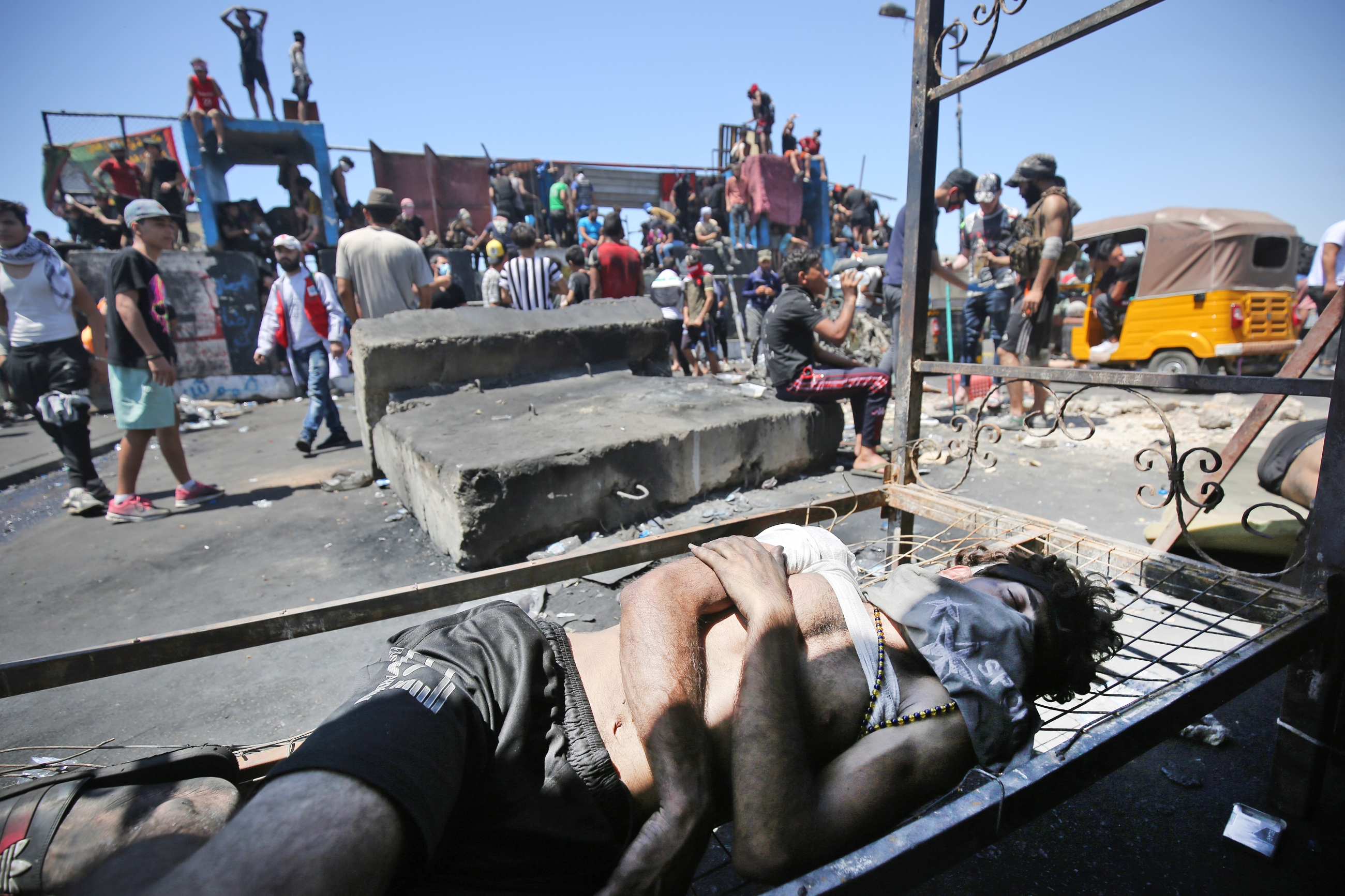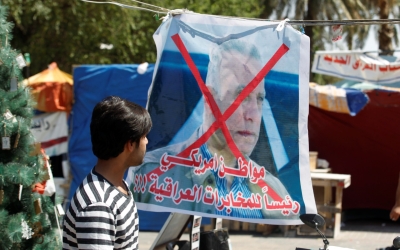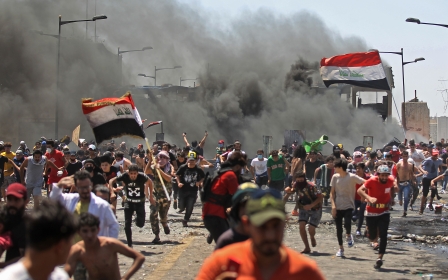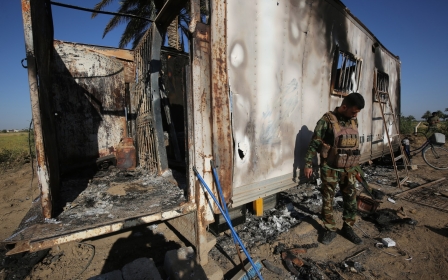Coronavirus fears leave Iraq's anti-government protesters divided

With Iraq's coronavirus lockdown beginning to lift, Iraq's anti-government protest movement - suspended in February as the pandemic began to hit - has slowly returned to life.
On Saturday, demonstrators took to the streets of Baghdad and other cities to reject the newly established government of Prime Minister Mustafa al-Kadhimi, who they condemned as just another interchangeable member of Iraq's political establishment.
However, the numbers were considerably fewer than when the movement was at its height in December, when it forced the ouster of former Prime Minister Adel Abdul Mahdi. Today, many protesters are unsure whether returning to the streets this soon could risk spreading Covid-19, while others are fearful of another brutal crackdown by security services.
Some also believe that Kadhimi should be given a chance and not immediately written off. The new premier has repeatedly promised to hold those responsible for violence against protesters accountable and, in a goodwill gesture, ordered the release of all protesters arrested since the demonstrations began in October 2019.
'In early October last year, I faced the live bullets and tear gas and never thought about going back home. But in order to avoid spreading the virus among protesters, I think we have to stay home'
- Abdulaleem Asaad al-Mandlawi, protester
Iraq’s health ministry said on Wednesday that the total number of Covid-19 infections currently stood at 3,032, with 115 deaths and 1,966 recoveries.
New MEE newsletter: Jerusalem Dispatch
Sign up to get the latest insights and analysis on Israel-Palestine, alongside Turkey Unpacked and other MEE newsletters
Although the country has so far not fared so badly compared with some of its neighbours, Iraq's fragile healthcare system and limited resources mean that some are still fearful of the impact of a spike in infections.
Abdulaleem Asaad al-Mandlawi, a 21-year-old protester from Baghdad, told Middle East Eye that he was not willing to return to the streets, despite others having done so over the weekend.
“At the moment, I have not agreed to go back to the streets due to the spread of the Covid-19 pandemic,” he explained.
“In early October last year, I faced the live bullets and tear gas and never thought about going back home. But in order to avoid spreading the virus among protesters, I think we have to stay home."
He added that he was pleased with the moves that Kadhimi had made towards trying to acknowledge the protesters' demands so far.
"I think that we protesters must give him a chance to do his promises - if he does nothing, then we return to escalation,” he said.
'A drop in the ocean'
During a regular meeting with his cabinet in Baghdad on Tuesday, Kadhimi reaffirmed his commitment to protecting the right to protest, adding that he would not tolerate any act of aggression or violence against the demonstrations.
Despite this, scores of demonstrators were injured in clashes with security forces, after hundreds of them had gathered in Habbobi Square in the southern city of Nasiriyah on Saturday and began calling for a total political overhaul.
A day later, protesters in Basra gathered in front of a local government building and called for the resignation of Basra governor Asaad al-Edani and his two deputies, Mohammed al-Timimi and Durgham al-Ajwadi.
They moved towards the headquarters of the small political party Thaa’r Allah, situated near to Basra’s protest area. Shortly after, someone inside the building opened fire on them, killing one activist.
In response, Kadhimi ordered a raid on the building, arresting six members of the group.
"Under my direction, our security forces carried out operations to detain those behind assaulting protesters in Basra, based on judicial warrants," he said in a tweet.
"I promised that those who have spilled Iraqi blood will not be allowed to rest and we are honouring that promise.”
Although protesters have praised the arrest of the group and welcomed Kadhimi's stated aim of protecting demonstrators, some remain sceptical about whether he will be able to actually rein in the powerful militias that hold sway over much of Iraq's social and political life.
“It is a good step that Kadhimi closed the Thaa’r Allah headquarters in Basra, but it is like a drop in the ocean in the eyes of people,” said Mohammed Qasim, a protester from the southern Iraqi city.
“Militias are more dangerous than coronavirus. Iraq has Covid-19 - coronavirus - and Covid-20 - militias.”
Others have questioned how Kadhimi - who had been the country's intelligence chief since 2016 - could be anything other than fully aware of who had been behind the killing of protesters, a death toll which has reached more than 550.
“We demand the release of all detainees from police station prisons, and those who have been arrested by armed groups and we still did not know their whereabouts," added Qasim.
'A temporary decision'
Yousif al-Hashimi, a journalist and social media activist from Nasiriyah, said that trying to hold demonstrations during a global pandemic would not help achieve the demands originally set out by the October revolutions: ending corruption, creating jobs, restoring public services and ending foreign intervention in the country.
“The right path activists should take is by giving the new PM a chance and waiting for Covid-19 to be over so they are not judged to be increasing the risk of spreading the virus," he said, though also criticising Kadhimi for failing to yet produce a plan for protecting protesters.
With the months-long protest movement effectively mothballed since the beginning of the coronavirus pandemic, there have been some who feared it would not be possible to return to the streets with the same energy as before.
But despite all the problems, activists are determined to regain the moment.
“It is just a temporary decision," said Mandlawi. "But once the virus ends, we will return stronger than before."
Middle East Eye delivers independent and unrivalled coverage and analysis of the Middle East, North Africa and beyond. To learn more about republishing this content and the associated fees, please fill out this form. More about MEE can be found here.





